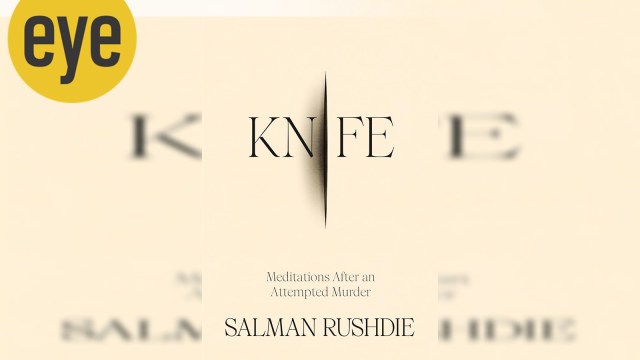Knife: Salman Rushdie’s temptation of, and triumph over, fate
The book is an attempt to recover the strength of Rushdie, the person, occluded by Rushdie, the targeted writer
 Knife by Salman Rushdie (Image credit: Amazon)
Knife by Salman Rushdie (Image credit: Amazon)In Knife, Salman Rushdie’s son, Milan, who had been researching knife attacks, incredulously asks his father at one point, “There are so many cases where somebody just gets stabbed once and dies. And you got stabbed, like, fifteen times and are still alive.” Knife is not just evidence that Salman Rushdie is alive after the horrific stabbing attack on him. It is a glorious testament to the fact that he is, against, all odds, in command of his own fate. We are often nonplussed in the face of violence because violence, as Rushdie writes, shatters reality. The act of writing is an act of recovery of order of sorts.
The book is ostensibly an attempt to come to terms with August 12, 2022, the day Rushdie was attacked in Chautauqua, New York. It is a coming-to-terms at four different levels. The first is coming to terms with the physical trauma of the attack, in which Rushdie lost an eye and the use of an arm. The book vividly describes both the attack and the slow, painful, fitful process of recovery. Writers, Rushdie says, riffing off Günter Grass and Jorge Borges, are always two people: The person and the writer. The writer is a persona created out of the books, circulating in the world, whose meaning the writer cannot quite control. This is the persona of Rushdie’s that has been a target, from Khomeini’s fatwa to the more recent attack. There is then the person Rushdie, an embodied being, a party animal, with his private jokes, pain and laughter, loves, friendships, view of the world. In some ways, this book is an attempt to recover the strength of that person, who has become occluded by the persona of the writer. But in coming to terms with the attack through the act of writing, in some ways making it an object of thinking and feeling, Rushdie uses the very persona that prompted the attack to recover the strength of his person.
The second is a coming-to-terms with the attacker, who Rushdie refuses to name and merely calls A. This is a surprisingly deft and empathetic portrait of his attacker. Rushdie relies on statements given by the attacker and creates an imaginary dialogue with him. The key malaise of the attacker is not fundamentalism, it is loneliness. In a pithy series of reflections, Rushdie creates a psychologically acute and sociologically smart profile of the attacker: A New Jersey kid who starts hating Rushdie because he finds Rushdie “disingenuous.” This is, of course, a familiar theme in the biography of so many modern attackers, from Anders Breivik to Rushdie’s attacker. The malaise of modernity is not a return to fundamentalism. Rather fundamentalism is a conduit through which a profound hostility to the world, borne out of loneliness, is revealed: It is as much a cry for meaning and attention as anything else. The puzzle is not so much the ideas they embrace, as it is the conditions of their existence that make them embrace it.
The third theme is a continuation of Joseph Anton: A Memoir, a kind of literary autobiography where Rushdie talks about the myriad influences on his writing. There is a mild touch of defensiveness about The Satanic Verses, but Rushdie as an Enlightenment figure of our time is in full flow. There is a bewildering range of references, Rushdie’s usual trademark puns and play of language, the high jokes and the low jokes, and what he calls his “associative” style of thinking in full flow. The book becomes a rousing defense of freedom. Much of his ire, in a somewhat repetitive way, is directed against liberals who peddle the illusion of creating a world without offence.
The one thing Rushdie is not, of course, is lonely. The third theme of the book is a kind of mini love story, about his wife Eliza, his two children, and their coping with the attack, while also helping Rushdie recover. Rushdie courted his wife Eliza in the most unusual circumstances. He was at a party where she was present, and both decided to go out on the terrace to see the city lights. But the exit was a glass door. While Eliza went out through the open door, Rushdie ended up walking straight into the glass door, nearly fainted, and suffered serious injuries to his nose. Eliza came with him in the car that took him to the hospital, and thus began the courtship. This darkly comic scene that seems straight out of a B-grade comedy, is, in a sense, profoundly empowering. From this accident comes out a relationship. But it is also a reminder that for Rushdie, like for Montaigne, the most empowering sensibility is to be able to laugh at the world rather than cry at it, even in the face of its tragedies. In this book, Rushdie describes the Christian cultural influence on him. He might have added that Jesus’s key attribute, as we have now often forgotten, was also his mirth. In Rushdie’s jokes, his mirth, and his mocking, he tempts fate. But he also triumphs over it.



- 01
- 02




























